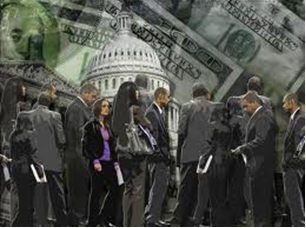
『由于全球经济遭受了一个又一个破坏性的冲击,美国经济的复苏阻力重重,美国劳动力市场也随之萎靡不振。』
America's jobless recovery Not again
以失业为特征的美国经济复苏,别再来了
June 3rd 2011 | from The Economist

AMERICAN labour markets are faltering, and the script looks distressingly familiar. In the spring of 2010, a strong American economic recovery finally seemed imminent. In the three months to May of last year, private employers added over 400,000 workers and the future looked brighter still. But a crisis in Europe shook market confidence. As investors fled to safety, firms grew nervous and hiring slowed. Only in the fall of last year—not long after the Federal Reserve announced a new round of stimulative asset purchases—did activity pick up.
And in 2011? In the three months to April, private employers added over 700,000 jobs, and conditions again seemed to be improving. But the global economy has suffered one disruptive shock after another. Bad weather dragged down activity early in the year and political instability in North Africa and the Middle East boosted oil prices. A devastating disaster in Japan seems to have had a bigger impact on the Japanese economy, and on global trade, than was initially expected. Big emerging markets—primary sources of global growth in recent years—have been working to slow their economies to tamp down rapid inflation. And Europe's crisis continues to worsen.
Amid these headwinds, American growth has disappointed, falling short of the 4% annual rates projected early in the year. And labour market trouble followed. This morning, the Bureau of Labour Statistics released a dismal economic report. After producing job gains averaging 220,000 per month in the three months to April, the economy added just 54,000 in May, below expectations. The private sector did a bit better, adding 83,000 jobs, but that was well off the healthy rate of hiring enjoyed earlier in the year. The unemployment rate rose to 9.1%, from 9.0% in April.
It's not too difficult to spot the sources of economic weakness in the details of the report. Manufacturing employment fell by 5,000 jobs in May after rising steadily in previous months, a testament to the worsening outlook for exports in a weakening global economy. Retail trade employment growth also tumbled, as nervous consumers trimmed spending. America's job woes have also been self-inflicted. Private firms have added over 1.7m jobs in the past 12 months, but the government has shed nearly half a million over the same period (not counting the loss of temporary Census jobs last year). Local governments alone have cut 446,000 positions since September of 2008. Some of those government jobs losses reflect a sensible rationalisation of workforces. Too many of them reflect the damaging effect of pro-cyclical budget cutting due to balanced-budget rules in cash-strapped states. More federal aid to states might have dampened the reductions, easing the drag on national growth.
Budget issues at the federal level may also be contributing to the slowdown. Unexpectedly large federal budget cuts are chipping away at quarterly growth rates with less of a cushion than previously imagined. The 0.5 percentage point drag due to slashed spending seems less problematic when the economy is expected to expand at 4%—as was once hoped for the first half of 2011—than when it's growing at less than 2%.
The ongoing debt-ceiling battle is an additional source of uncertainty. Legislators continue to bicker over how and how much to trim from the federal budget in exchange for an agreement to raise the nation's statutory limit on borrowing. Failure to raise the ceiling by August will trigger default.
In a global economy this volatile, the American economy is going to have a rocky month here and there. But American government officials are doing themselves no favours. Federal Reserve officials are overly concerned with inflation given the outlook for slowing global growth. Now is no time for policy tightening. And elected representatives in Washington are playing with fire. By cutting too much spending in the short-term and turning the debt-ceiling fight into a political battle, Congress risks making a large unforced error. The economy is simply too vulnerable at the moment for politicians to make those kinds of mistakes.(666words)
特别声明:①凡本网注明稿件来源为"原创"的,转载必须注明"稿件来源:育路网",违者将依法追究责任;
②部分稿件来源于网络,如有侵权,请联系我们沟通解决。
25人觉得有用
24
2011.10
『流动劳动力不仅自己受益,如学习新技术,积累储蓄等,还给接收他们的富有国家创造劳动机会,并有可能......
24
2011.10
『没有一种密码是100%安全的,然而有一种新的方法能使被偷的密码失效。』
新的方法能使被偷的密码失......
24
2011.10
『虽然谷歌互联网电视目前仍不被消费者和生产商们认可,但还需几年来判定这一产品是成功还是失败,目前......
24
2011.10
『网站估价远远高于其实际价值的迹象表明互联网泡沫在20世纪90年代出现后,又卷土重来了。』 The n......
24
2011.10
『他人身体上的痛苦会触发我们痛苦的感受,然而,看到他人处于某一尴尬情景,也会使我们产生类似的感受......
24
2011.10
2012年的中医综合考试大纲出来已久,通过参看其内容结构以及试卷题型结构可以看出,今年的考试大纲......